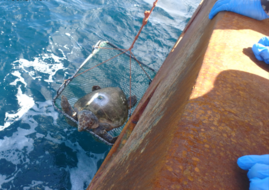Aerial whale monitoring, courtesy NOAA
TRENTON - New Jersey Department of Environmental Protection Commissioner Shawn M. LaTourette and New Jersey Board of Public Utilities President Christine Guhl-Sadovy March 25 announced the award of nearly $3.7 million in funding for scientific research projects being undertaken to ensure ecologically responsible development of offshore wind energy, an integral part of the Murphy administration's climate change response and resilience strategy.
Projects newly funded through the state's ongoing Research and Monitoring Initiative include an aerial survey of whales, whale satellite-tagging study, study of seasonal water-mixing dynamics, expansion of an existing tracking system for birds and bats, and a study focused on sea turtle behavior and health.
| Development of offshore wind energy is critical to mitigating and responding to the worsening impacts of climate change, LaTourette said in a release. These projects continue to advance our collection of important baseline scientific information that is necessary to ensure the responsible development and operation of offshore wind facilities. |
As we continue to pursue a 100% clean energy economy by 2035, it's imperative that we not only protect the interests of our ratepayers but safeguard the vitality of our marine ecosystems as well, NJBPU President Guhl-Sadovy said. The Research Monitoring Initiative is a crucial piece of our comprehensive efforts to responsibly develop New Jersey's nation-leading offshore wind industry.
The RMI, jointly administered by the DEP and BPU, employs a rigorous scientific approach to coordinate research on potential impacts of the development, operation, and eventual decommissioning of offshore wind energy to ensure the state's offshore wind energy goals are achieved responsibly and with as little impact on natural resources as possible.
Project details
 Sea turtle research, courtesy Coonamessett Farm Foundation
Sea turtle research, courtesy Coonamessett Farm Foundation
Mid-Atlantic cold pool modeling study: Rutgers University has been awarded $97,462 to study the effects of offshore wind turbines and foundations on the Mid-Atlantic cold pool, a unique oceanographic feature important to marine ecosystems. The cold pool is characterized by a cold bottom layer of water that develops in the spring and breaks down in the fall as seasonal storms and high winds mix the thermal layers of the water column. Researchers will be using various analytical models and environmental data collected by RMI-funded Slocum undersea gliders in their evaluations.
Launched in 2021, RMI's ongoing research is contributing to a regional body of work being developed by federal partners such as the Bureau of Ocean Energy Management, the U.S Fish and Wildlife Service, and the National Oceanic and Atmospheric Administration (NOAA); regional entities such as the Regional Wildlife Science Collaborative for Offshore Wind and the Responsible Offshore Science Alliance; and state partners with shared ocean interests from Maine to North Carolina.
To date, RMI projects have received $13 million in funding through the BPU's second offshore wind energy solicitation. On Jan. 24, the BPU awarded a combined 3,742 MW of offshore wind capacity through its Third Offshore Wind Energy Solicitation, making an additional $39 million available to support RMI projects.